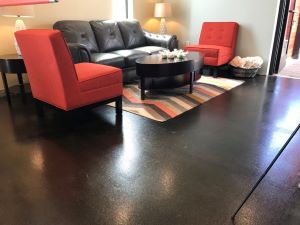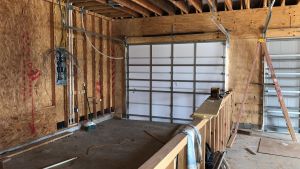Converting the garage into a living space is something most homeowners take into some serious consideration. As the family grows and the home seems to shrink, the attached garage becomes the easy way of adding living space.
In theory, this sounds great. And sometimes, this is a great idea – in practice too. After all, not all garages, needs, expectations, and bank accounts are the same.
So, let me start by asking: are you considering turning your garage into a living space? Because if you do, it’s best to consider the odds.
The good things with garage conversions
 Surely, the list of benefits is quite long. First of all, you achieve your objective, which is to enlarge the home by creating additional living space. And that alone comes with plenty of advantages, based on what the space has been turned into. Let’s say, the garage became your home office. That’s splendid! You can now work at home without anyone disturbing you – just saying. Or you created a beautiful guest room with a bathroom, even a kitchenette. Wonderful! Now you can have guests without making a mess inside the main house.
Surely, the list of benefits is quite long. First of all, you achieve your objective, which is to enlarge the home by creating additional living space. And that alone comes with plenty of advantages, based on what the space has been turned into. Let’s say, the garage became your home office. That’s splendid! You can now work at home without anyone disturbing you – just saying. Or you created a beautiful guest room with a bathroom, even a kitchenette. Wonderful! Now you can have guests without making a mess inside the main house.
If you consider that buying a new, larger home is truly expensive or that the thought of leaving this neighborhood you know and love to go elsewhere cheaper brings you closer to depression, converting the garage is a good idea. Or, if you are to fight all day about the mess in the house due to lack of space, by all means, do consider turning the garage into one more room.
Yes, converting the garage is nice, unless…
-
The thought of going through the legal channels makes your head spin
Garages are supposed to serve a certain purpose. That’s to host the car, even serve as storage space. But if this becomes a living space, you need permits. You need to check with the local authorities to see what’s permitted and which the restrictions are, especially if you are planning to remove the garage doors and along the pillar between them, create a bathroom or kitchen, etc.
Conversions that include drainage systems, adding windows, removing walls or pillars, installing electrical systems, etc. must follow the local building codes and need permits. For your own safety and peace of mind, you don’t want to skip this part. And it’s not easy to get such a permit, while you also pay a price for it too.
-
It cannot be converted
Don’t forget that you may not get the permit. Or, you may find out that the structure cannot change – for stability reasons and so, your dream of creating the space you wanted vanishes into thin air. Yes, as it’s often the case, our decisions may be shaped by things & factors that are beyond us.
-
You are considering selling the house
 While most people want to take advantage of the garage to create additional living space because they cannot move to a new home, this is not always the case. If you, by any chance, planning on selling the house soon, it’s best to reconsider converting the garage. The main reason? Most buyers want a home with a garage. Unless you have a huge garage and only converting part of it, unless you have two garages and only use one of them, it’s best to take into account that such conversions decrease home value.
While most people want to take advantage of the garage to create additional living space because they cannot move to a new home, this is not always the case. If you, by any chance, planning on selling the house soon, it’s best to reconsider converting the garage. The main reason? Most buyers want a home with a garage. Unless you have a huge garage and only converting part of it, unless you have two garages and only use one of them, it’s best to take into account that such conversions decrease home value.
-
It exceeds your budget
While converting the garage may be cheaper than buying a new house or even adding a room, it’s still a considerable cost. Even a tiny change, it will require plenty of tasks, like installing a new overhead garage door (or fixing/upgrading the existing one), adding heating and cooling equipment, getting new flooring, taking care of the walls, etc. Now, most conversions include much more than these tasks and so, the amount is considerable. So, perhaps, you should start with that.
-
It adds more headaches
Most garages are used as storage spaces – or even laundry rooms and gyms. This is the place, where you keep the tools, the family bikes, the garden furniture. You may forget it, but there’s a lot in your garage. Where are you going to put all these things? What’s the point of creating more living space and missing out the so-valuable storage space? Think of that too.






